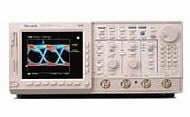

Applications
The TDS 700D oscilloscopes are the first in the TDS family of Digital Phosphor Oscilloscopes (DPOs) designed to keep pace with current and evolving needs in advanced electronic design and debug. DPOs deliver a new level of insight that makes dealing with complex signals elementary – a new level of insight that must be seen to be believed.
DPOs capture, store, display, and analyze, in real-time, three dimensions of signal information: amplitude, time, and distribution of amplitude over time. The benefit of this new third dimension of information is an interpretation of the signal dynamics, including instantaneous changes and the frequency of occurrence displayed in the form of quantitative intensity information.
Extensive user interface design has made the TDS family of products truly intuitive to operate. Each family member shares a familiar front panel layout with dedicated vertical, horizontal, and trigger controls. A graphical user interface with over 200 icons helps facilitate understanding and use of the advanced features. A color monitor helps rapidly distinguish between multiple waveforms and measurements. On-line help provides a convenient built-in reference manual.
High Fidelity Signal Acquisition
The high waveform capture rate of the TDS 700D DPO series, together with its high bandwidth and sample rate, delivers instantaneous signal feedback to show the true signals that other scopes may be missing. The DPO acquisition acquires up to 1000 times more data than typical DSOs, allowing the capture of complex signals, reducing debugging times from hours to seconds.
Channels can be transparently combined to achieve higher sample rates and longer record lengths. The record length can be optionally increased to 8M points, providing a high-resolution representation of the signal over a long period of time. All of the TDS products provide wide dynamic range, flat response, fast overdrive recovery, calibrated DC offset, 1 mV/div sensitivity (10 mV/div maximum sensitivity on TDS 794D), 1 ns peak detect, and internal calibration.
Powerfurl and Flexible Triggering
In addition to basic triggering such as edge and pulsewidth, these Digtial Phosphor Oscilloscopes have several trigger modes tailored for specific design and debug applications. Logic and pulse triggers, including setup/hold, glitch, slew rate, and timeout triggers, capture hard-to-catch digital design problems. The optional video trigger provides line and field selection for NTSC, PAL, and HDTV standards. The optional communications trigger capability addresses needs to acquire a wide variety of AMI, CMI, NRZ, and Ethernet communication signals.
Advanced Performance Features
Digital Phosphor Oscilloscopes provide three dimensions of signal information including amplitude, time, and the distribution of amplitude over time; in the form of quantitative intensity information. The resulting information-rich display enables the user’s eye to integrate the subtle patterns and variations of actual signal behavior. Color –Grading displays historical information that has been acquired over time. This is especially powerful when used in DPO operation, where the colors show relatively how often random events occur.
Automatic Measurements eliminate the need for manually measuring the waveform against the graticule or with cursors. Measurement gating, (gating not available for DPO operation) allows the user to select a specific part of the live waveform for measurement. Measurement statistics (min, max, mean, and standard deviation), give additional information about the variations in the measurements over time (for example, worst case excursions), increasing the confidence in the quality of the measurements.
Waveform Histograms allow the examination of the statistical nature of the signal. Horizontal histograms, which are useful for evaluating signal jitter, sample the waveform within a specified region, sort the values into time bins, and plot the accumulated bin values versus time. Vertical histograms, which are useful for evaluating signal noise, sample the waveform within a specified region, sort the values into amplitude bins, and plot the accumulated bin values versus amplitude. For histograms of DPO acquisitions (both live and stored), the specified region can be repositioned and will update to reflect the underlying 3 dimensional data base (32 bits in shallow mode, 64 bits in deep mode).
Communication Mask Testing (available as an option) allows mask compliance testing of a wide variety of communication signals to industry standards. Specialized measurement accessories, unique trigger modes, built-in optical reference receiver filters, mask autoset, and mask violation counting make these measurements easily and repeatably.
Model No
TDS724D
Condition
Used
Manufacturer
Tektronix
Channels
2
Frequency
500 MHz
Record length
50 kPts
Sampling rate
2 GS/s
5
Add video trigger (NTSC , PAL , HDTV , FlexFormat)
13
RS232/Centronics Hardcopy Interfaces
1F
Floppy Disc Drive
1G
1 GS/s maximum
1M
Add 130 K/channel memory length (500K max on TDS794D , TDS784D , TDS754D , TDS580D , TDS540D) 250K max (TDS724D , TDS520D).
2C
Communication Signal Analyzer
2F
Extended waveform math: FFT , integration , and differentiation
2M
Add 2M/channel memory length (8M max on TDS794D , TDS784D , TDS754D , TDS580D , TDS540D; 4M max on TDS724D , TDS520D). Includes internal hard disk drive
3C
Short-wavelength (Fibre Channel FC133 , FC266 , FC513 , FC1063) Optical Reference Receiver
4C
Long-wavelength (SONET/SDH OC1/STM0 , OC3/STM1 , OC12/STM4) Optical Reference Receiver
Hey👋Let's start with your email